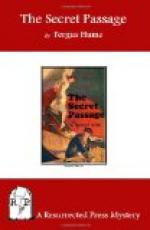At half-past eight he drove to the Avon Hotel and was shown up at once to his uncle’s sitting-room. That he should live in an hotel was another of Caranby’s eccentricities. He had a house in town and three in the country, yet for years he had lived—as the saying is—on his portmanteau. Even the villa at Nice he owned was unoccupied by this strange nobleman, and was usually let to rich Americans. When in England he stopped at the Avon Hotel and when in the country remained at any inn of the neighborhood in which he might chance to find himself wandering. And wandering is an excellent word to apply to Lord Caranby’s peregrinations. He was as restless as a gipsy and far more aimless. He never appeared to take an interest in anything: he was always moving here, there and everywhere, and had—so far as Cuthbert knew— no object in life. His reason for this Cainlike behavior, Caranby never condescended to explain.
When his nephew entered the room, looking smart and handsome in his accurate evening suit, Caranby, who was seated near the fire, stood up courteously to welcome him, leaning on his cane. He suffered from sciatica, and could not walk save with the assistance of his stick. And on this account also, he always insisted on the room being heated to an extraordinary degree. Like a salamander he basked in the heat, and would not allow either door or window to be opened, even in the midst of summer, when a large fire made the apartment almost unendurable. Cuthbert felt as though he were walking into a Turkish bath, and sat as far away from the fire as he could. After saluting him, his uncle sank back into his seat and looked at him inquiringly.
Lord Caranby was tall and thin—almost emaciated—with a lean, sallow, clean-shaven face, and a scanty crop of fair hair mixed with gray. His eyes were sunken but full of vitality, although usually they were grave and somewhat sad. His hands were deformed with gout, but for all that he wore several costly rings. He was perfectly dressed, and as quiet and composed as an artist’s model. When he spoke it was in an unemotional way, as though he had exhausted all expression of his feelings early in life. Perhaps he had, for from what Cuthbert had heard from his uncle, the past of that nobleman was not without excitement. But Caranby’s name was rarely mentioned in London. He remained so much abroad that he had quite dropped out of the circle to the entry of which his rank entitled him. His age was sixty-five.
“You are surprised at seeing me again to-night,” said Cuthbert.
“I am never surprised at anything,” replied his uncle dryly, “but we exhausted all we had to say to one another before eight o’clock last night, at which time you left. I therefore don’t know why you have come this evening. Our conversation is bound to be dull, and—excuse me—I can’t afford to be bored at my age.”
“I cannot say that our conversation was particularly agreeable last night,” rejoined Mallow, equally dryly, “we talked business and money matters, and about your will.”




